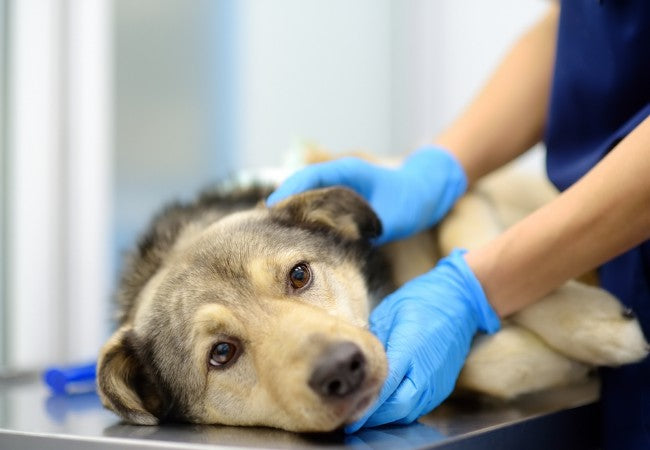Vet’s 2025 Guide to Lymphadenitis in Dogs 🩺🐾

In this article
Vet’s 2025 Guide to Lymphadenitis in Dogs 🩺🐾
By Dr. Duncan Houston BVSc
Lymphadenitis refers to painful, inflamed lymph nodes resulting from infection or immune activity. Though not as widely discussed as cancer, it can be uncomfortable for dogs and may signal serious underlying issues. In 2025, proactive vet care and supportive home strategies are essential. This guide covers everything—causes, signs, diagnosis, treatment, and pet-owner tips with brand support from Ask A Vet.
1️⃣ What Is Lymphadenitis?
When lymph nodes become inflamed due to bacteria, fungi, viruses, parasites, or immune reactions, they enlarge, become tender, and may even drain pus or form abscesses. Nodes felt under the jaw, behind the shoulders, groin or knees may be involved.
2️⃣ What Causes It?
- Bacterial infections: common culprits include Pasteurella, Bacteroides, Fusobacterium; also Yersinia, Francisella.
- Fungal infections: systemic diseases like blastomycosis, histoplasmosis may involve nodes.
- Viral, parasitic, protozoal: non-specific viral enlargement, toxoplasmosis, or leishmaniasis.
- Autoimmune or sterile types: rare immune-mediated nodal inflammation—springer spaniels, young dogs—respond to steroids.
- Immune stimulation/allergy: less common, but lymph nodes may enlarge.
3️⃣ Recognising the Signs
- Firm, painful lumps under the jaw, chest, groin, knees
- Fever, poor appetite, lethargy, malaise
- Swelling, warmth, occasional abscesses/draining tracts
- Other symptoms (cough, diarrhea, difficulty swallowing) are based on the infection site
- Typically, systemic signs accompany the nodal inflammation
4️⃣ Diagnosing Lymphadenitis
- History & Exam: vet palpates to confirm nodes are affected
- CBC/chemistry/urinalysis: check infection, inflammation, systemic health
- Fine-needle aspirate (FNA): cytology distinguishes infection, granuloma or cancer
- Biopsy: tissue sampling when deeper investigation is needed
- Imaging (X-ray/ultrasound): assesses deeper nodes or internal involvement
- PCR or cultures: identify specific pathogens
5️⃣ Treatment Strategies
- Antibiotics: broad-spectrum initially, tailored after labs
- Antifungals: for fungal-caused lymphadenitis
- Steroids: for sterile immune-mediated cases, dogs often respond quickly
- Drainage or surgery: for abscesses or chronic swelling
- Treatment of systemic disease: e.g., antiprotozoals, tick-borne disease therapy
- Cancer cases: chemotherapy, radiation, or surgical excision
6️⃣ Supportive Care at Home
- Ask A Vet: Telehealth check-ins help monitor treatment, temperature, and appetite.
- Warm compresses: ease discomfort at home
- Pain relief & nutrition: NSAIDs, rest, high-quality food, hydration.
7️⃣ Prognosis & Monitoring
- Infectious: nodes typically shrink within 2–4 weeks of treatment
- Sterile cases: rapid response to steroids—but regular monitoring needed
- Cancer: prognosis depends on type/stage; lymphoma often requires ongoing oncology
- Recheck exams: every 1–2 weeks initially, then adjust based on response.
- Home vigilance: track appetite, fever, new swelling, or general behaviour.
8️⃣ Prevention & Wellness Tips
- Promptly treat wounds or infections to reduce nodal response.
- Keep up vaccinations and parasite prevention to minimize systemic risk.
- Regular check-ups to detect early enlargement in predisposed dogs.
- Use Ask A Vet for early advice when swelling is first noticed.
9️⃣ When to Contact the Vet Immediately
- High fever, lethargy, and refusal to eat.
- Painful or rapidly growing lumps beneath the skin.
- Signs of systemic infection—vomiting, diarrhea, coughing.
- No improvement after 5–7 days of treatment.
- Recurring lymph node swelling or new nodes appearing.
🔟 Final Thoughts
Lymphadenitis, while often manageable, can hide serious illnesses—early vet attention is key. With targeted diagnostics, appropriate therapy, and at-home support via Ask A Vet, gentle enrichment, and stress relief, most dogs recover well in 2025. Consistent monitoring safeguards long-term health. 🐶❤️
Need help with diagnostics, ongoing support, or treatment adjustments? Visit AskAVet.com and download the Ask A Vet app for trusted veterinary guidance anytime. 📱🐾






